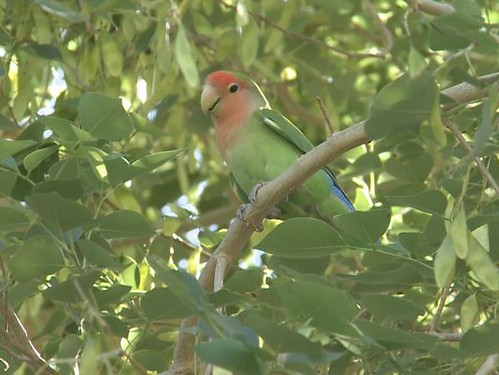 Those cute little rosy-faced birds you may see in your neighborhood are not native Arizonans, although there are a lot of lovebirds in the Valley.If you love to feed wild birds or have to deal with the mess they leave behind, these latest test results should be taken seriously
Those cute little rosy-faced birds you may see in your neighborhood are not native Arizonans, although there are a lot of lovebirds in the Valley.If you love to feed wild birds or have to deal with the mess they leave behind, these latest test results should be taken seriously
Those cute little rosy-faced birds you may see in your neighborhood are not native Arizonans, although there are a lot of lovebirds in the Valley.
Arizona Game and Fish Department officials want the public to be aware of a potential health threat following the discovery of the disease psittacosis, also known as parrot fever, in dead lovebirds in Scottsdale.
Recently a Scottsdale homeowner reported finding 20 dead lovebirds in his yard. Game and Fish test results came in Friday, showing the birds had psittacosis.
The disease can spread to humans and be difficult to diagnose.
Last summer, it infected an east Mesa woman who used a leaf blower to clean up after some messy lovebirds, according to Game and Fish. She came down with a mysterious respiratory condition doctors had a tough time figuring out. When Game and Fish discovered psittacosis in dead birds on her property, that gave doctors the information they needed to diagnose her.
Game and Fish officials say it takes from one to four weeks from exposure to become infected. Symptoms can vary, from a severe nagging cough to achiness and an eye infection. Those with preexisting immune-system conditions can have complications.
The good news is the right antibiotics can clear up the illness, according to Game and Fish.
"Commonly it's caught from people who own pet birds -- pet parrots and that sort of thing," said Dr. Anne Justice-Allen, an Arizona Game and Fish veterinarian. "Occasionally, when we have an outbreak like this, and there's a lot of the bacteria that cause psittacosis floating around in an environment, people that are cleaning up that environment can be exposed and inhale the organism and get sick."
Game and Fish offers these tips to avoid infection:
- Be cautious how you feed wild birds
- Don't overfeed -- it attracts too many birds, which leave behind too much waste; overfeeding can also artificially keep wild-bird populations high
- Use diluted bleach when cleaning up bird waste, at a ratio of about one cup per gallon of water
- Report any sick or dead animals to Game and Fish online or at (877) 972-8426